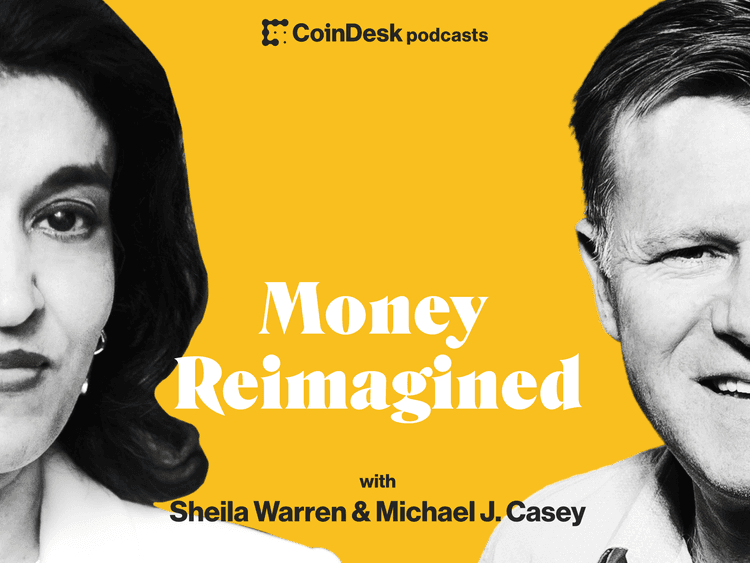Understanding China's Fast-Approaching Digital Yuan
Join Jen Zhu Scott, Executive Chairman of The Commons Project, Tanvi Ratna, CEO of Policy 4.0, along with hosts Michael J. Casey and Sheila Warren of the World Economic Forum for a deep-dive into the potential ramifications of, and thought behind China's forthcoming DCEP, better known as the digital yuan.
ABOUT
On this episode of CoinDesk's Money Reimagined, join Jen Zhu Scott, executive chairman of The Commons Project, Tanvi Ratna, CEO of Policy 4.0, along with hosts Michael J. Casey of CoinDesk and Sheila Warren of the World Economic Forum for this deep dive into the potential of, and thought behind, China's forthcoming DCEP, better known as the digital yuan.
In the lore of digital disruption, Eastman Kodak Co.'s downfall is particularly momentous.
Kodak was once one of the world's most powerful companies. But it failed to act on digital cameras and online photo sharing, despite seeing the trends years before. (Kodak engineer Steve Sasson created the first digital camera in 1975.)
The digital yuan
It's an apt story to remember now as the digital money revolution rolls ahead at a time of historic political transition.
With DCEP, China’s supply chains will become hyper-efficient, giving it a big advantage over other countries’ production sectors. And as those models extend into China’s international One Belt One Road initiative, foreign dependency on its production processes could grow, giving Beijing geopolitical clout.
Out of this, China will forge financial autonomy. Its digital currency will eventually be interoperable with other tokens and blockchains, allowing its businesses and their foreign trading partners to move money across borders without using dollars as an intermediary. They’ll bypass New York, in other words.
Solution: Open money
This won’t happen overnight. But the effect on confidence in the U.S. could arise within the next four years.
How should Washington react? Christopher Giancarlo, former CFTC chairman and the founder of the Digital Dollar Foundation, is pushing for a digital dollar that would integrate constitutionally enshrined privacy protections, making it more appealing than the digital yuan, which many fear will become a Beijing surveillance tool.
But will people truly trust the U.S. not to monitor digital dollar transactions? After all, as Jennifer Zhu Scott, chair of the Commons Project, noted in this week’s Money Reimagined podcast, global finance is already subject to a comprehensive U.S.-led system of surveillance.
So, while we’re right to worry about a Chinese “panopticon” ingesting people’s identifying information, that’s not the data threat the U.S. can or should compete with. In the same podcast episode, Policy 4.0 CEO Tanvi Ratna said the bigger issue is how troves of DCEP-generated anonymized data will enable Chinese businesses to extract huge efficiencies and unlock innovation across decentralized economic systems.
There may be a way for the U.S. to compete here. But it will require a radical, disruptive solution. This is an episode you won't want to miss.
See also: Crucial to Asset Allocation in the 2020s: Financial Advisers Talk About Bitcoin’s Rising Relevance
Original Album Art Image by Kido Dong / Unsplash modified by CoinDesk.
HOSTS
Michael J. Casey is Chairman of The Decentralized AI Society, former Chief Content Officer at CoinDesk and co-author of Our Biggest Fight: Reclaiming Liberty, Humanity, and Dignity in the Digital Age. Previously, Casey was the CEO of Streambed Media, a company he cofounded to develop provenance data for digital content. He was also a senior advisor at MIT Media Labs's Digital Currency Initiative and a senior lecturer at MIT Sloan School of Management. Prior to joining MIT, Casey spent 18 years at The Wall Street Journal, where his last position was as a senior columnist covering global economic affairs.
Casey has authored five books, including "The Age of Cryptocurrency: How Bitcoin and Digital Money are Challenging the Global Economic Order" and "The Truth Machine: The Blockchain and the Future of Everything," both co-authored with Paul Vigna.
Upon joining CoinDesk full time, Casey resigned from a variety of paid advisory positions. He maintains unpaid posts as an advisor to not-for-profit organizations, including MIT Media Lab's Digital Currency Initiative and The Deep Trust Alliance. He is a shareholder and non-executive chairman of Streambed Media.
Casey owns bitcoin.

EPISODES
Crypto's Future of Policy, Politics, and the Fight for a Pro-Crypto Government
Messari’s Ryan Selkis from Bitcoin to crypto policy.
Jun 14, 2024
Embracing Nuance and Logic | The Diverse Community of Crypto
Post-Consensus 2024 reflections and examining the crypto industry and the implications of the U.S. Presidential elect...
Jun 5, 2024
‘Tokenization Is the Future of Real Assets.’
Max Boonen, CEO, and Co-Founder PV01, shares the advancements in technology and the war over regulation for tokenizat...
May 22, 2024
Future-Proofing Finance: MICA, Crypto Disclosure, and Global Regulatory Challenges
Bluprynt CEO and Georgetown Law Professor, Christopher J Brummer highlights the crucial need for financial disclosure...
May 18, 2024

The Mining Pod
Feb 10, 2025

CoinDesk Podcast Network
The top stories and best shows in the blockchain world, delivered daily from the team at CoinDesk.
Dec 20, 2023

Markets Daily Crypto Roundup
Tune in as CoinDesk runs down daily action in bitcoin markets and some of the most important recent industry development.
Dec 19, 2023

Unchained
Unchained, your no hype resource for all things crypto by former Forbes senior editor Laura Shin, author of The Cryptopians.
Dec 18, 2023

